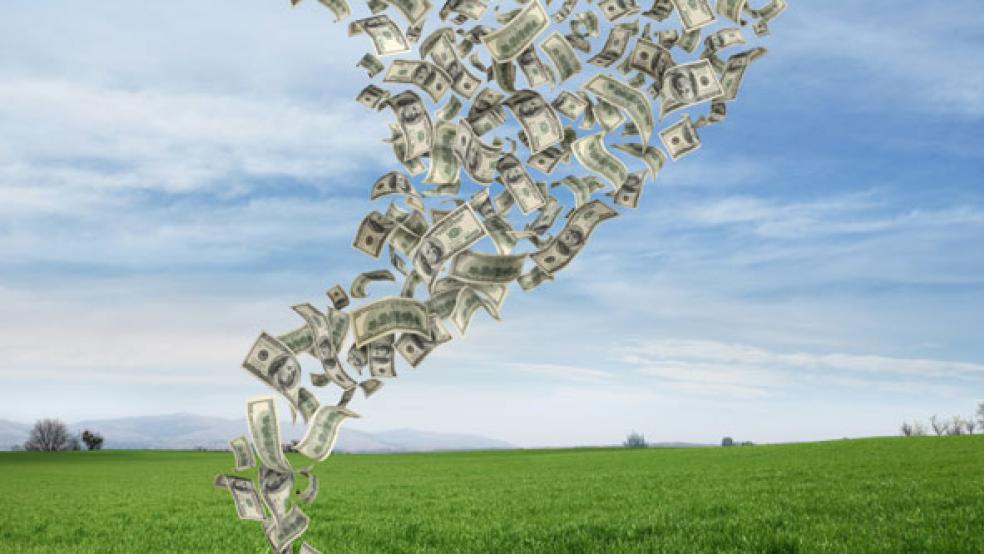The most frightening irrational force in the universe this August hasn’t been Midwestern thunderstorms. It hasn’t even been Michele Bachmann reassuring her followers that default would be good for the economy. It’s the stock market. Defying all predictions and logic, the Dow crashed, rather than rejoiced, when Congress finally ended its debt ceiling standoff. On Monday it acted shocked — shocked! — to the tune of a 635-point loss when Standard and Poor’s downgraded U.S. Treasury debt from AAA to AA+, even though the agency had promised it would do just that. Then, yesterday, even though S&P had not recanted and Treasuries were still AA+, the Average rallied 430 points, its best gain since 2009. Then came today. By the time the bell rang on the NYSE, the bear had wiped out another trillion or so and stood 18 percent below its April high.
All this might be merely entertaining if your 401(k), your retirement, and your kids’ and grandkids’ education funds weren’t caught in the chaos. Some answers are in order.
This madness wasn’t really about the downgrade after all, was it?
Clearly not. Standard and Poor’s telegraphed its punch, warning that unless Congress began to behave like adults and cut the deficit by at least $4 trillion, a downgrade would follow. Congress, as you know, came up quite short, both in dollars and adulthood. Judging from the rising costs of credit default swaps, the derivatives that act like default insurance on debt, investors shared S&P’s opinion of the country’s flagging commitment to pay its creditors.
Even more persuasive: Since they were downgraded, prices on Treasuries have actually risen — exactly the opposite of what you’d expect if investors cared deeply about S&P’s rating. Clearly investors didn’t believe Uncle Sam had really become a more dangerous borrower over the weekend.
So what are they worried about?
There’s no shortage of worries. In dealing with its own debt crisis, the European Central Bank has had done an even worse job, if possible, than Congress did in dealing with its crisis. Worse still, from stocks’ point of view, weakness in the U.S. economy has raised questions about whether the economy was headed back to recession. Richard Urwin, global head of equity investing at BlackRock, Inc., the world’s largest money manager, blamed the economy rather than the rating agency. “I think the market was weighing a substantial downgrading of global growth prospects ,” he said, “coupled with political and monetary leaders’ inability to do anything about it.” In other words, it’s the economy, stupid, and stupid leadership. It’s not the stupid downgrade.
Okay, but why did all this seem to coincide with the downgrade?
Who knows? It wasn’t as if the downgrade came out of the blue or revealed anything about U.S. debt and policy that investors didn’t already know. Maybe it was all rapid-trading computers. Maybe it was markets, having had no practice in any constructive way to react to a downgrade of U.S. stocks, reacted by panicking. We don’t know.
And why did the market rebound yesterday? Did something happen?
Not really. The Fed released a statement saying that it would keep interest rates near zero until the middle of 2013, basically promising to continue what it has been doing for the past three years. Economists’ reaction has ranged from a shrug to confusion. Maybe what spurred the rebound was a realization by investors that, as Urwin puts it, “equities are a significantly undervalued asset class” — or at least the last place in the financial markets where you can get a yield above a few fractions of a percent.
So the investors decided that stocks were overpriced for a slow growth economy; then they collectively overruled themselves and drove prices up. Today, they overruled themselves again. It seems utterly random.
You were expecting Newtonian physics?
Does this signal the beginning of a recession?
It might, but a recession is hardly pre-ordained. Robert Doll, chief equity strategist for fundamental equities at BlackRock, points out in a letter to clients that there have been 30 declines of more than 15 percent in the stock market since the Great Depression. Only two predicted recession. Most of the time the market bounced back — as it did last spring, when (have you already forgotten?) the market fell 17 percent on fears about the European debt crisis, only to rebound by 33 percent through April.
Bob Johnson, senior economist with the independent rating firm Morningstar, thinks that the weak economic data that so spooked the market this summer was the delayed result of the Japanese tsunami. “Japan’s auto industry went from building 750,000 cars in April of 2010 to around 250,000 in the same month this year,” he says. “That’s 500,000 cars fewer. How many tons of steel is that? How many tons of rubber? It’s hard to overestimate the follow-on effects that kind of disruption can have in the global supply chain.” Johnson thinks that once the tsunami effect wears off, economic growth will pick up again. Even Goldman Sachs, which has reason to be gloomy after losing money on 15 separate trading days in the second quarter, put the odds of recession at only one in three.
One in three sounds like pretty bad odds to me. If there is a recession, will it be as rough as 2008?
Probably not. The 2008 crisis brought us to the brink of financial collapse, and we’re nowhere near that point now. But one element of the situation heightens the risk. When the 2008 crash hit, interest rates were higher, so that the Federal Reserve had room to lower them to stimulate growth. Politically, Congress had more freedom to spend money for the same goal. Both those weapons are no longer available. If a recession did hit, there’d be nothing we could do except grin and bear it.
But a replay of 2008 is unlikely. Larry Swedroe, research director for Buckingham Asset Management in St. Louis, points out that the spread between interest rates on overnight bank loans and Treasury bills—a key measure of liquidity in the financial system — is a narrow 0.26 percent. That’s healthy. It had been 16 times higher during the 2008 crisis.
That evidence, says Swedroe, puts the blame for the market’s emotional roller coaster back on Washington. “We don’t have a financial crisis or a liquidity crisis or even an economic crisis,” he says. “We have a political crisis.” Washington could put the market’s summer fears to rest by passing a pro-growth, economically rational plan in place to bring the deficit under control over the next few decades. “I’m not saying that’s simple to do in the current Washington atmosphere,” allows Swedroe. “But at least we know what we have to do.”





